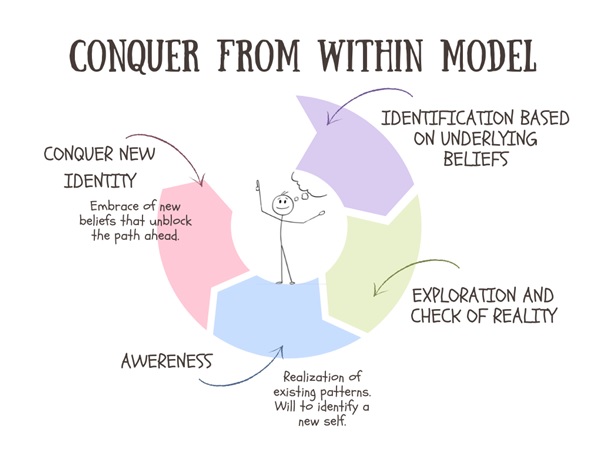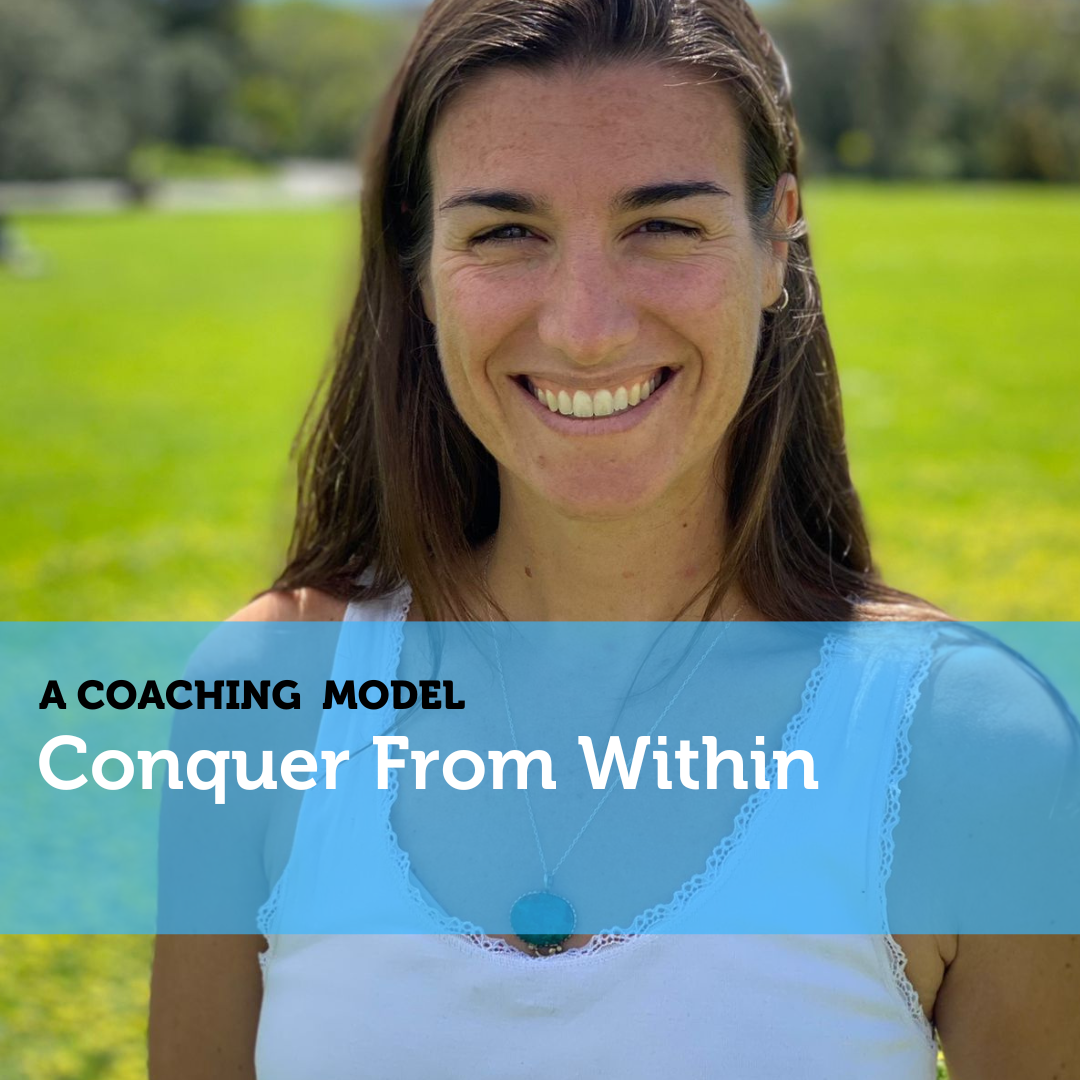A Coaching Model By Julia Viladomiu, Motherhood Coach, NEW ZEALAND
A Journey to Conquer From Within
The model that I am embracing and trying to get ownership of, follows a very simple, but very deep and meaningful, structure.
The clients that I am addressing are in a stage of feeling stuck, where they cannot see the path ahead clearly. That comes along, most of the time, with feelings of anxiety for not knowing in what direction they have to walk.
The answers to all of those questions, like all the answers in any other topic related to oneself, are within, we just need to bring light and focus on those.
The model that I am presenting, to unlock the doors that are keeping the light away from the answers, helps the client to reconnect with themselves.
Bringing awareness to their fortes and working on underlying beliefs[1] that may not be helping them to keep walking in the directions that will get them to become the best version of themselves.
Byron Katie is the author of “loving what it is” and “the work” and has been working alongside individuals on dismantling underlying beliefs to help them continue their journey with a deeper connection with themselves and what it is important to them.
In Byron Katie’s words:
The awareness of a change in identity needs to surface, but it is already there.
This author has worked over the years to unrevealing suffering, her main tool is very coach-like, based on three main questions to start questioning oneself. She applied them to any problem, conflict, or situation in life, but they can be especially useful in coaching sessions when the coach is in front of strong underlying beliefs;
- Is this true?
- Can you absolutely know that it is true?
- Who would you be without that thought?
Eckhart Tolle has also written in his book “the power of now a very significant and powerful sentence that can be very relevant to understand my model:
To truly change, you have to change your identification with what you ARE.
We see the world how we are. We interpret what we see, so each of us sees different things out of the same action or situation.
Based on that statement, self-knowledge, why we interpret the world the way we do, and our values and beliefs are an answer to this question. And by helping the client to deal with their new identity we will, at the same time, help them to relate to the world that they live in and have made constructions based on their old interpretation, with a more conscious approach. Because helping the clients to rediscover themselves also opens their mindset, and the understanding that everybody goes through a permanent process of transitioning. That everybody sees the world and reacts to elements due to their own beliefs and interpretations.
In conclusion, going through a process of change that deep reveals to the individual how complex one is. And by extension, how everyone is. Empathy and acceptance can also take a huge role in this transformation.
4 Ways to Conquer From Within
My coaching practice blends Katie’s techniques, Tolle’s learnings, and my own intuition and approach to coaching and can be described visually below:

Approach to the Session
In a coaching session, I try to generate an atmosphere of confidence, intimacy, and relaxation, where the clients feel secure and respected.
I am diving into my practice in a close human way, with a gentle and respectful approach, using emotions and feelings as tools of self-discovery and connection with oneself.
Some tools to be used to support the model and get through the exploration and check of reality with the clients are based on calling for inconsistency in their dialogue with themselves. A few questions that can help the coachee could be the following;
- What is the story that you are telling yourself?
- When you say yourself, who is you, and who is telling the story?
- How can you become more aware of what is already there as identity?
- What question can you make yourself to validate it or start the path of underlying it to sake the truth?
When awareness of existing patterns reveals, when willingness to change is evident, and “aha” moments are present in the conversation;
- How does this new realization feel?
- How do you picture your life having this new strong belief about yourself?
- How can you expand this exercise, that you have done for this particular area of your personality, to others?
- What positive impact this process is having or will have in the short term?
- And in the long term?
- Can you think of one time in your life when that wasn’t true?
Possible Outcomes of the Model
Taking responsibility for who one is actually a card of freedom to walk towards and through life knowing that you have a choice and that you are not predisposed or prefixed to certain structures of your mind. Unlocking the client’s tool to reveal their true selves will help the self-manage for life, and as we have seen earlier in this document, be more capable to relate to others.
Those outcomes can be directly linked to neuroscience[2], by changing our approach to ourselves we generate changes in our brain that generate neuroplasticity, which will help to create new behaviors based on our new belief system. Brain-based coaching facilitates a new level of thinking, based on Dan Beverly’s research,
these large-scale connections are energising, and though coaching we can work together to harness this energy and motivation to get into action on these insights.
As coaches, we are reinforcing new wiring.
Learn How to Create Your Own Coaching Model
Your Coaching Model reflects your values,
philosophies, and beliefs and must communicate who you will coach
and the problems you will solve. Read more about creating your coaching model
References
Professional Coaching Programm, ICA.
Neuroscience Module
Underlying Beliefs Module
The What, Why, and How of Brain-Based Coaching (2022) Dan Beverly PCC | Leadership Coaching for Women.
Tolle, E. (2004). The Power of Now: A Guide to Spiritual Enlightenment. Vancouver, B.C.: Namaste Pub. ; Novato, Calif.
Katie, B. And Mitchell, S. (2002). Loving What Is. Harmony.
Underlying Beliefs Are the Core Beliefs, Values, Thoughts, and Judgments We Hold About Ourselves and Others. We Perceive Them as Absolute Truths. They Are Emotional and Psychological and Often Irrational. Underlying Beliefs Module.
Neuroscience: The Scientific Study of the Body’s Nervous System. Neuroscience Module
